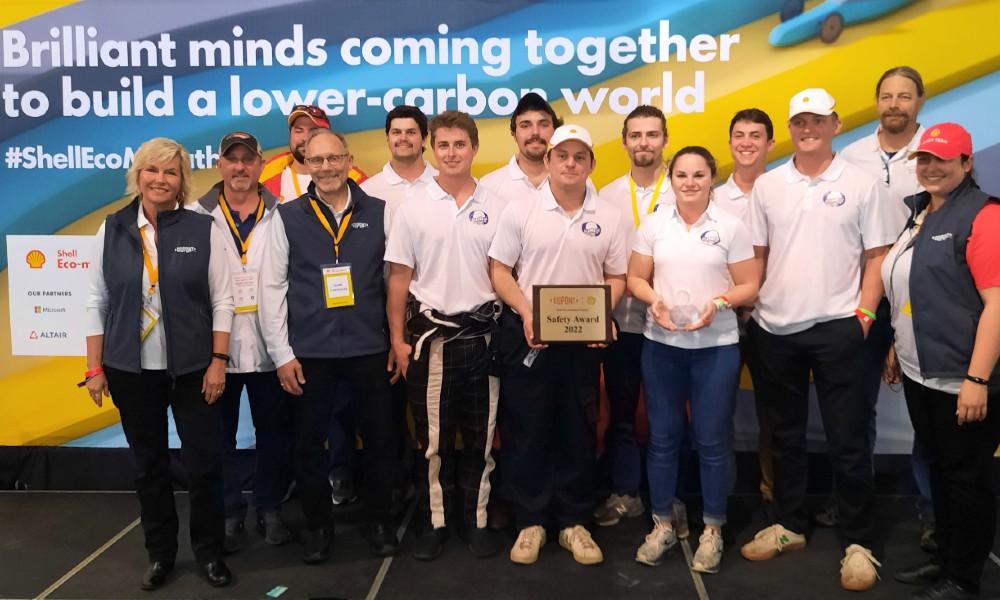Eco Shell Marathon team wins Dupont Safety Award
News
By: Meghan Long, CISE Writer
JMU engineering students Adam Gremminger, Camden Hollowell, Kyle Lewis, Nick Pumpelly, Jake Schmank, Jack Stephenson, Charlotte Solak, and Nick Tsoleas joined together to participate in the Shell Eco-marathon competition.
The competition challenges Science, Technology, Engineering, and Math (STEM) students worldwide to design, build, and operate energy-efficient vehicles. Carbon emissions contribute to greenhouse gases which significantly impact climate change around the globe.The combination of environmental and automotive contexts results in a competition that is compelling to engineering students.
JMU engineering's involvement in this prestigious competition has evolved over the past few years. The current team competed in the Prototype/Internal Combustion Engine (Gasoline) category and built on the efforts of those before them. Students inherited a full vehicle chassis, but they had significant work to do. The engine system required modifications to include fuel injection and an electronic ignition, these components needed to be integrated with an Electronic Control Unit (ECU) and subsequently tuned. The drive system from the engine and drive wheel was not adequate for the competition goals and there was a need for a vehicle testing device.
The team split into three sub-teams. The first group focused on fabricating an engine dynamometer, the second dealt with engine/propulsion optimization, and the third group designed and fabricated the drive system.
The students' work in the competition earned them The Dupont Safety Award. This notable honor recognizes the team with a superior commitment to safety. Students earned this honor after the safety judges took note of the group's intentional safety approach to shop practices and their work during the competition. In addition, the judges noted the team's unique emphasis on using safety as a guiding principle in planning out their travel logistics.
"To work on the vehicle for two years and seeing it all come to fruition at the competition in Indianapolis was incredible," says Pumpelly. "Winning the safety award and completing successful laps was a huge success for the team. Nothing will beat the feeling of seeing Kyle drive the car around the brickyard after all the analysis, design, fabrication and testing we did to get the car going strong."
Rob Prins and Robert Nagel, Professors of Engineering and co-advisors to JMU's Shell Eco-marathon team note the team's admirable ability to work together. "The team functions very well," says Prins. "Working with them has been an enjoyable experience."
“We worked very hard over the last two years to finish this project,” says Solak. “Through this project we all became friends and learned more than we could have imagined about engineering. We’re proud of our work and we are excited to see what the next team does.”
Prins emphasizes how the students have been able to grow through their capstone experience. "As with many other teams, the biggest growth I observed is their development of individual agency and responsibility. As individual members, they have demonstrated significant increases in their ability to apply engineering principles to problems," he says.
The 2022 team is the fifth JMU engineering team to engage with the Shell Eco-marathon competition, a sixth team has been preparing for the last semester to take over the car for the 2023 season and a seventh team is beginning to form for 2024. Prins notes that the complex nature of the project provides numerous opportunities to transform students into engineers while the blending of environment and automotive contexts into a competition serves to motivate students to do the work required to grow.
